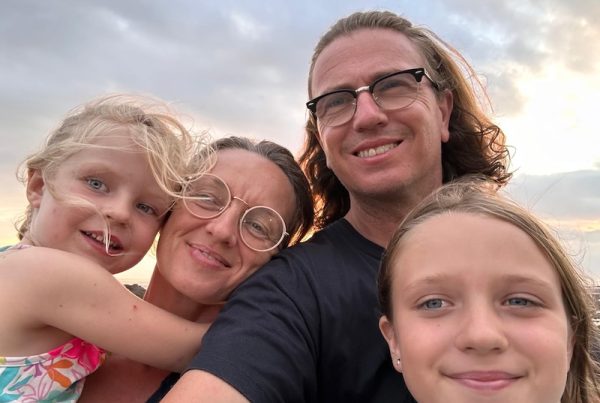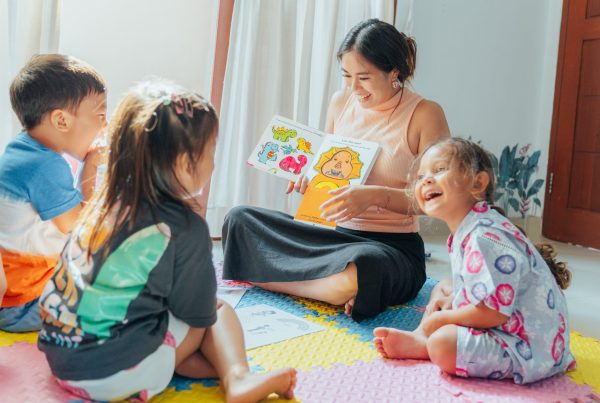Lisa, a property entrepreneur from Melbourne, Australia, unfolds her family’s unique six-month adventure in Ubud. Alongside her artist husband, Roger, and their 15-year-old daughter, Skye, Lisa remotely manages Eden Yarra Valley, an accommodation business catering to various events. The decision to embrace Bali’s tropical lifestyle stemmed from a desire to escape the ordinary, triggered by the poignant realisation of life’s brevity after the unexpected passing of a family member. In this interview, Lisa shares the challenges of managing her business from afar, the family’s enchanting Bali experiences, and the delicate balance between professional and personal life.
Additionally, Lisa discusses the pivotal decision to choose a micro-schooling option for Skye, their teenage daughter, and witnesses her thrive in the unique academic environment. This tailored educational approach by Spark Bali, recommended by Simone, allowed Skye to be part of a small class of teens in Ubud, fostering a one-on-one teaching experience that significantly contributed to her academic success.
It was also delightful to meet up with Lisa and chat over an Indian lunch at Cafe Vespa in Sayan Ubud.

Can you tell us a little bit about yourself and where are you originally from?
We are a family of three from Melbourne, Australia. I’m Lisa and I’m primarily a property entrepreneur these days, with my main role as owner/manager of Eden Yarra Valley, an accommodation business which caters for large groups for weddings, birthdays and corporate stays. My husband Roger is an artist and runs two art-related businesses. Our 15 year old daughter Skye is a year 10 high school student.
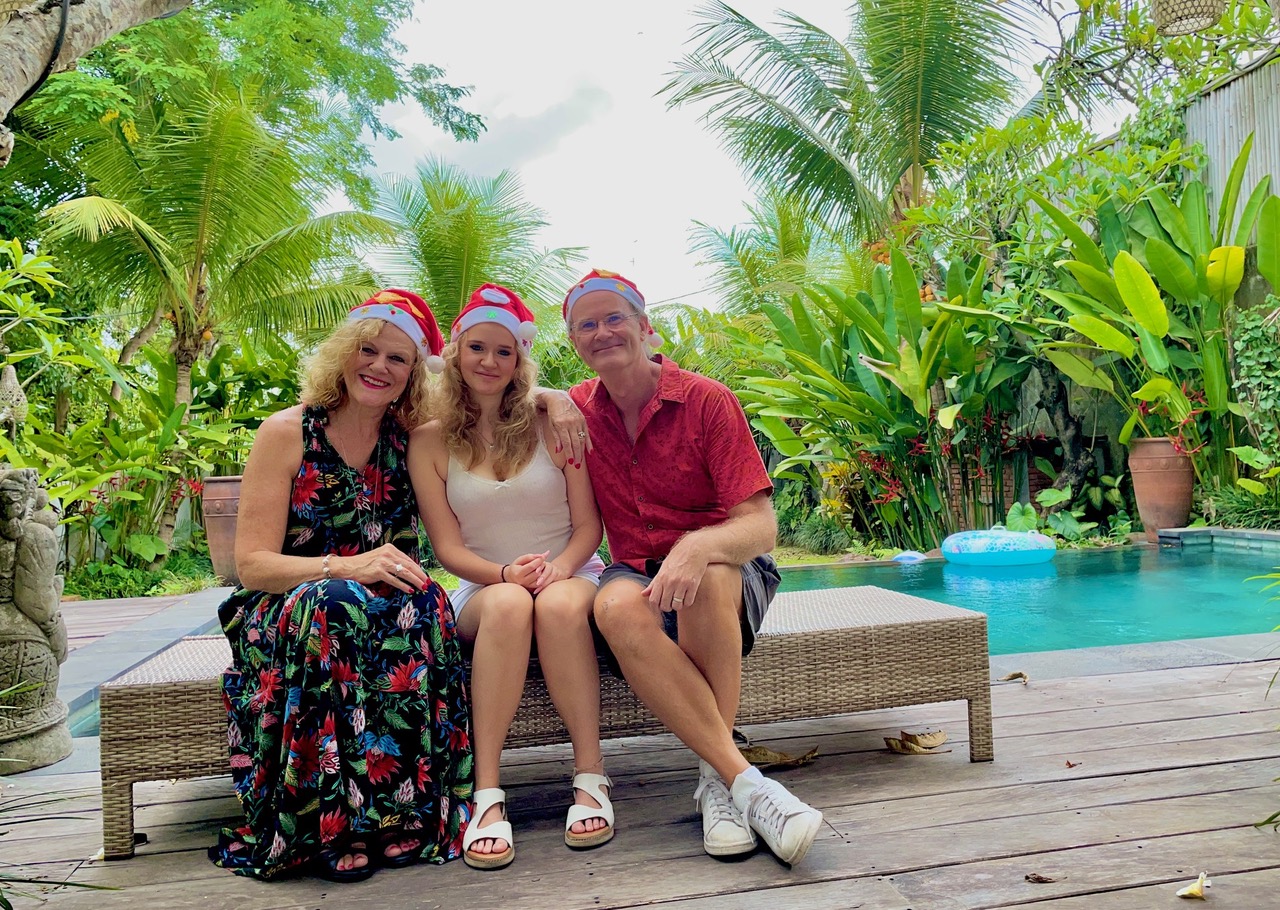
When did you first arrive in Bali, and what brought you here?
We escaped the dreary Melbourne winter and landed in sunny Bali at the start of August 2023. What brought us here? We had a vision of living a totally different life for a few months, of taking a few risks, of fulfilling a dream of a six month family adventure! We didn’t know how it would all go, what to expect, or what challenges, surprises and unexpected bonuses we would all experience.
How did you hear about Our Year in Bali, and what was your experience like with Simone’s assistance?
I heard Simone interviewed on a podcast and then booked an introductory call with her. At that stage, we had not actually decided to go, just doing some research. Simone was a great help in advising on Bali life, especially schooling options which was our top priority for Skye. We had decided on the timing for the trip before the additional pressures of Year 11 began.
What motivated you to move to Bali, and how did you go about making the decision to do so?
Like many Australians, we had taken a few trips to Bali over the years. Several years ago, Roger heard about the (now-famous) Green School. He always said it would be a dream for Skye to have that unique jungle school experience if we could possibly make it happen. Once we were in a position to consider this, and we looked into the school, it became apparent that their strict 1 year minimum enrolment period was the biggest barrier.
As far as making the decision to take the island life plunge, one factor was the unexpected illness and passing of a family member, which really brought home for me that ‘Life is short. If not now, then when?’ And so, we made the decision to go just 3 short months before leaving.
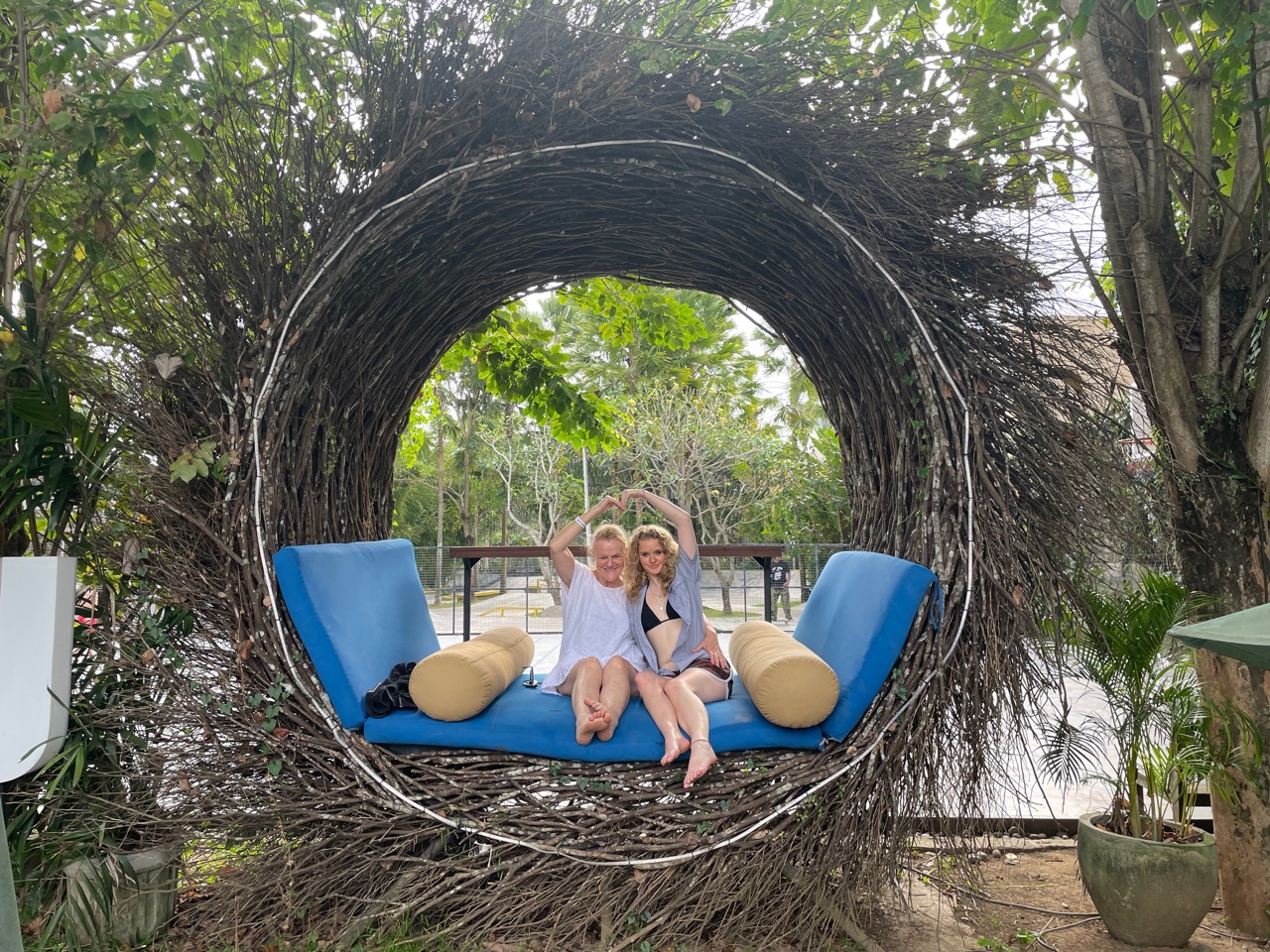
Where in Bali do you live, and what made you choose that location?
We live in Ubud in an area about 10 minutes from the centre of town. For us, we were always drawn to Ubud for the art, culture, music, beautiful rice fields and jungle views, the cooler climate and overall less ‘touristy’ vibe. We have zero interest in the daily lifestyle of the traditional tourist hotspots of Kuta/Legian/Seminyak with Bintang consumption morning to night, rugby/AFL matches blaring from every pub/café TV, open air ‘beer buses’ cruising the streets, hundreds of tattoo parlours touting their wares, and being harassed to buy taxis/massages/sarongs at every turn….
Roger also is a huge fan of Gamelan, Bali’s traditional instrumental music, which is also very evident in Ubud, and something you experience daily as the locals practice their performances for the regular ceremonies the Balinese participate in.
We live in a beautiful and private villa which has 3 large bedrooms with balconies, 4 bathrooms, large living room and well equipped kitchen, AC in all rooms, and most importantly is fully enclosed. And a sunny pool and tropical garden which is lovely. Our favourite thing to do is to jump in the pool for a night swim after coming home from dinner, where we all just shoot the breeze and share our day’s activities. We are in a very local neighbourhood, and are the only Bules (Indonesian word for white persons) here. There are two local schools a few metres away and the kids are always singing, chanting their lessons and doing exercises in the street.

How has the schooling experience been like for your 15-year-old daughter? How was it meeting other parents and the kids making friends?
The schooling experience for us has been nothing short of amazing! We could not have wished for more in terms of the experiences that Skye has had here. After a recommendation from Simone, we researched a micro school in Ubud called SparkBali, had a call with the owner Daniela Budi and decided to enrol Skye. When I say micro school – there were just 19 kids, all teens, and Skye was in a class of six. Kids were also from many different countries. The standard of the curriculum (based on the UK’s Cambridge system) was excellent – far higher than we thought it would be!
Skye had not particularly enjoyed school in Australia, but here she loved it, and her reports were all A’s and B’s for the first time ever. The school had a cook who would make beautiful lunches and snacks, and the kids and teachers all ate together. Each day was a different cuisine – Spanish, Indian, Mexican, French, Italian, Balinese… and it always looked delicious. Once a week, 4 of the students also had to select the menu, cook, prepare and serve all the food.
Because of the small size of the school, it was almost a one-one-one teaching experience, and this was ideal for our daughter to learn at her own pace and improve her grades. Due to the small classes and the fact that Skye is not sporty, and didn’t want to join teams where she had to run around in the heat, she didn’t meet a lot of other girls her age, which was a shame. We made friends with other parents though and hung out with a few of them regularly.

What are some of the biggest challenges you’ve faced when moving to Bali?
Housing, housing and housing! We booked an Airbnb for the first 4 weeks thinking it would be easy to find somewhere suitable once on the ground. It was so difficult find something that fitted our essentials list:
Fully enclosed (almost all properties in Ubud are open, literally no walls to the kitchen and living areas and most bathrooms b) 3 bedrooms, as most are 2 bedrooms 3) AC in all rooms 4 ) have a functional kitchen as we like to cook (mostly you’re lucky to get is a small sink (cold tap only), a 2-burner gas cooktop and a tiny bench top. Found exactly what we were looking for, but only after a full month and around 25 inspections, and many stressful nights.
Living in Ubud, you also need to be prepared for an avalanche of nature as you are surrounded by jungle. There are geckos everywhere inside and out, totally harmless but they make frequent loud noises often at 3am right above your head! Ants everywhere. Moths and grasshoppers. Frogs and crickets when the rainy season starts. Bats. Mosquitos (although these were not as bad as I feared).
Dogs are everywhere, and in our street lots of annoying barking. Roosters also like to make themselves known very early. If you live anywhere near Ubud’s Monkey Forest, there will also be monkeys in the streets, trees and hanging around the restaurants, who have no fear at all of humans.
How has living in Bali influenced your personal and professional life, and what opportunities have you found here?
I successfully proved I could manage an accommodation business in Victoria remotely, and the 3 hour time difference wasn’t a big problem. There are many opportunities here for those looking for them, but there are also challenges doing business here for foreigners. We spoke with quite a few Westerners who live and run businesses here who told us about the challenges they face. One Canadian entrepreneur with several businesses in Ubud told me she thinks of the many taxes and fees to be paid and strict restrictions on employing anyone but a local Balinese, as ‘the paradise tax’ you pay for getting to live and work in Bali.
On a personal level, our family has gotten to spend a lot of quality time together and enjoy many fun island activities, plus create a lifetime of memories!
Can you walk us through what a typical day looks like for you in Bali?
Daily life is a little different for each of us. We made the decision that we would always accompany our daughter in any transport, so that meant taking her to and from school, which Roger mainly did. Most days I would go to a gym class and often stop off for a coffee afterwards. I joined a few expat networking groups so would often go to those once a week. My work days were much like at home where I would do calls and emails related to my businesses, however my ‘work uniform’ was often bathers, and my ‘office view‘ was of the pool and coconut palms and garden, framed by a relentlessly blue sky. Skye attended school 4 days a week with Fridays devoted to tutoring if required. Often Roger and Skye would go to their favourite cafes after school and explore different areas of Ubud. We would often try a new restaurant for dinner each night. At weekends, we also planned fun activities such as perfume and jewellery making workshops, rafting, ATV tours, snorkelling trips, art gallery days, temple visits and other cultural activities.
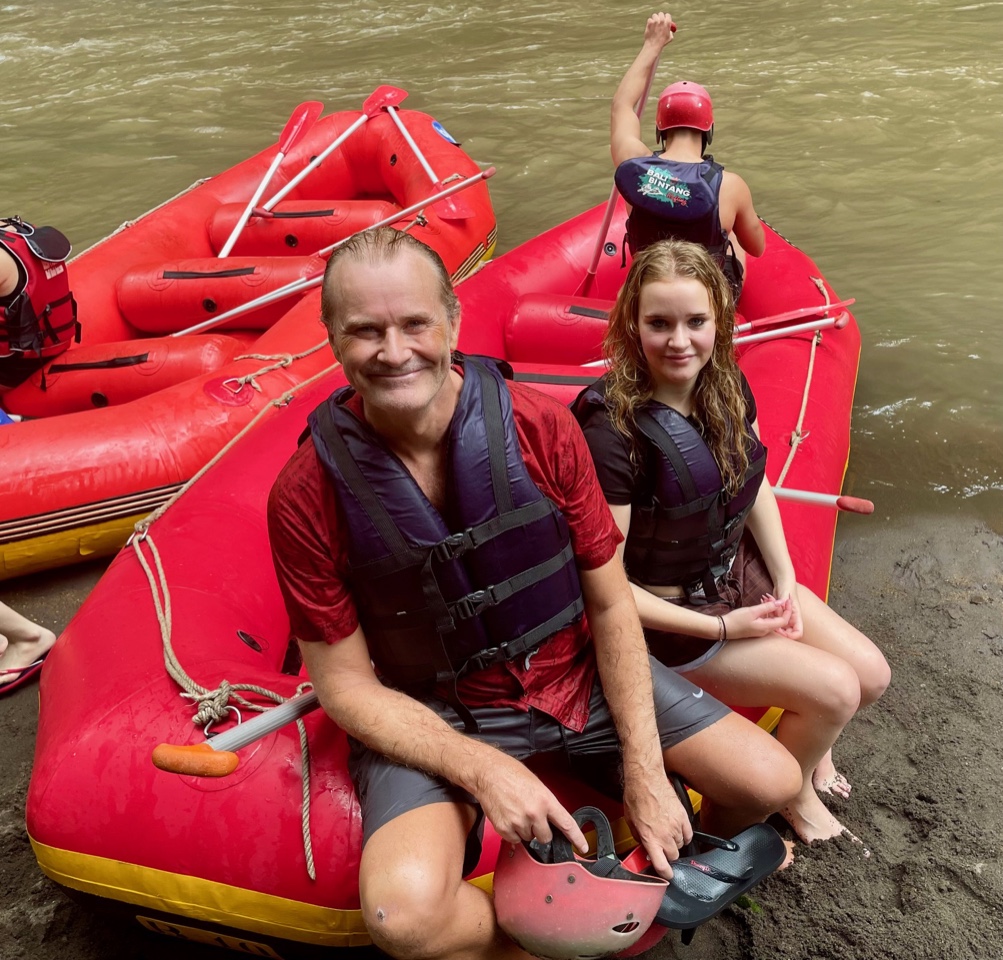
What would you say is the best thing about living in Bali?
Life is more relaxed for sure! The coffee served here is really excellent – every bit as good as Melbourne, which is renowned for its coffee culture. The diversity of the restaurant scene in Ubud is mind-blowing! There are over 1200 restaurants here alone and you can get any type of cuisine you desire. Many have incredible rooftop locations and jungle and pool views, where you can enjoy beautiful sunsets with an exotic cocktail in hand.
Things such as massages, manicures and beauty treatments are very affordable here. Taxis are cheap and easy to use with the apps. The weather is reliably consistent every day; sunny and humid. You can literally live in shorts, singlets and bathers as it never gets cold.
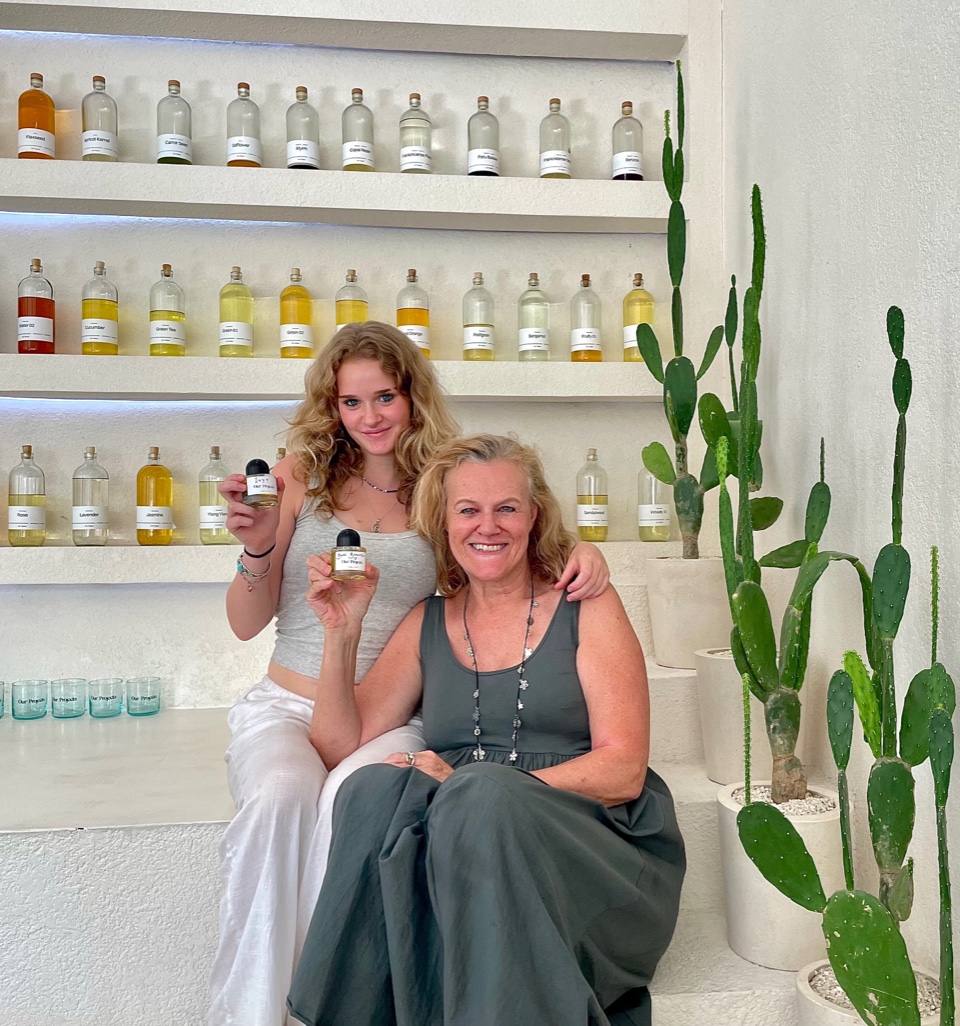
What are some factors that families looking to live in Bali should consider?
Medical care. Find a good local clinic. We only had to visit a medical clinic a few times, and the service was surprisingly fast, professional and good value. They even took blood tests on the spot and sent results to us via WhatsApp just 2 hours later, which was an excellent service.
A good school fit and school location is super important. Choose your home as close to a school as possible if you have kids. Traffic on the roads is crazy busy all the time. Before we moved to our villa, our first location took 45 minutes in a taxi to get less than 3 km away to the school, as the small roads are not designed for the sheer volume of bikes, cars and trucks they now carry. When we moved to the other side of town avoiding the centre, it was only an 8 minute drive.
Research the items that you cant buy here and bring a good supply. For example Aspirin is almost impossible to find anywhere. Sunscreen is also very expensive.
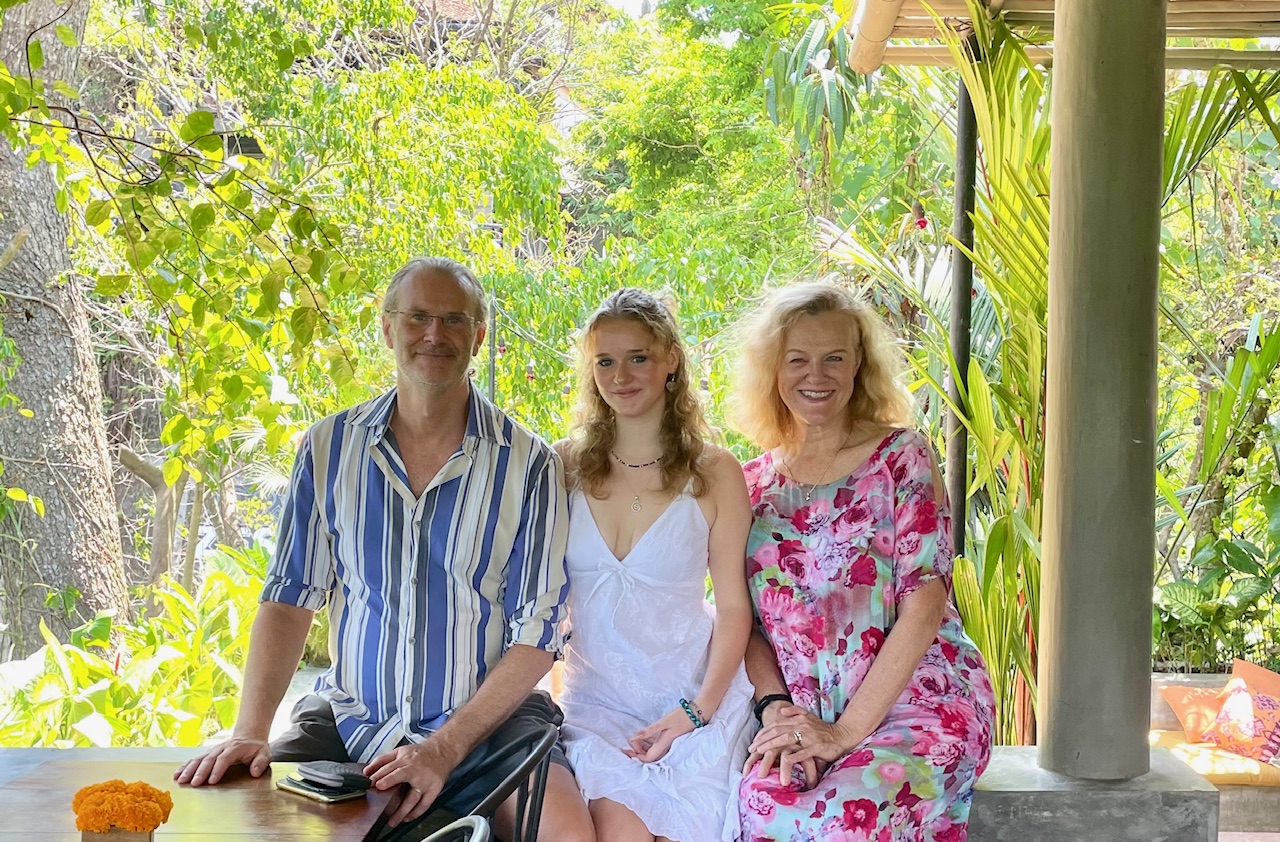
Is there anything else you would like to share about your experience living in Bali that we haven’t covered yet?
Don’t expect the same comforts that you take for granted at home. Like footpaths: In Ubud, they are a rare luxury. Don’t be surprised to be stepping over broken concrete, smelly open drains, undulating and wildly uneven surfaces, rubbish and stray dogs and cats. Don’t even think about taking a pram! Many roads have no space for pedestrians at all, and you are dodging bikes and cars continually if you have to walk. Plan what kind of transport you will use. Most people here use scooters, but for our family we decided never to get on a bike given the amount of terrible accidents that happen and the craziness of the traffic. No public infrastructure is well maintained. There are few rubbish bins anywhere. Locals are continually burning their rubbish by the side of the road or in fields creating plumes of black smoke.
After the pandemic, Bali is no longer a really affordable place to live, so you should budget carefully. Rents have tripled from what they were a few years back. Accommodation costs are on a par with Melbourne prices or higher – seriously, and not only that you must pay the whole lease payment upfront, so 12 months’ worth plus bond if that’s how long you sign up for. Supermarkets are super expensive also, especially for anything imported. So all your favourite brands can be 3 or 4 times as much as you are used to paying. Roger loves Haagen-Dazs vanilla ice-cream, and a tiny tub costs AUD $20 to give you an idea! And wine is heavily taxed: an AUD $15 bottle is likely to be $60-plus here, which is a great incentive for abstinence…
Finally I’d say, if you are considering a Bali adventure like ours, I’d just repeat my earlier inspiration “If not now, then when?”


